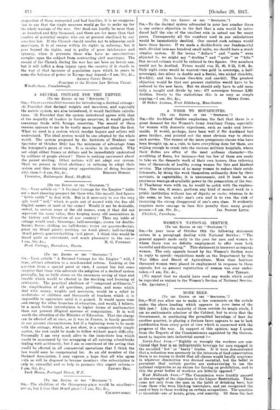A WORD TO HOUSEWIVES.
[To THE Herron 07 THE firscriroa."] Sta,—Sir Auckland Geddes emphasizes the fact that there is a great demand for the Women's Army Auxiliary Corps, especially for women with domestic experience, such as cooks and house- maids. It would, perhaps, have been well if Sir Auckland had gone further, and pointed out the moat obvious way to obtain such service. The women of the more prosperous classes who have been brought up, as a rule, to have everything done far them, are willing enough to °rush into the various military hospitals, where their duties are often of the moat arduous character—tho scrubbing of floors, for instance—but too few of them are ready to take on the domestic work of their own houses, thus relieving tens of thousands of healthy young women for this and kindred service. The reluctance of so many women to reduce their estab- lishments, by doing the work themselves ordinarily done by their servants, is regrettable; it is uneconomic, and it lends to an enormous wastage of available power in the prosecution of the war. If Thackeray were with us, he would be quick with the explana- tion. One can, it seems, perform any kind of menial work in a public institution without lose of dignity or caste; whereas to do the same, or less, -under one's own roof is to run the risk of incurring the strong disapproval of one's own class. It evidently requires more courage to face this penalty than many people


































 Previous page
Previous page